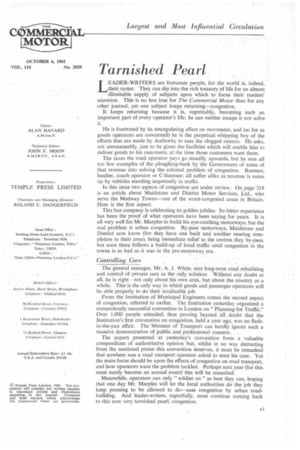Tarnished Pearl
Page 37

If you've noticed an error in this article please click here to report it so we can fix it.
LEADER-WRITERS are fortunate people, for the world is, indeed, their oyster. They can dip into the rich treasury of life for an almost illimitable supply of subjects upon which to focus their readers' attention. This is no less true for Tile Commercial Motor than for any other journal, yet one subject keeps returning—congestion.
It keeps returning because it is, regrettably, becoming such an important part of every operator's life; he can neither escape it nor solve it.
He is frustrated by its strangulating effect on movement, and (so far as goods operators are concerned) he is the perpetual whipping boy of the efforts that are made by Authority to ease the clogged centres. He asks, not unreasonably, just to be given the facilities which will enable him to deliver goods to his customers, at the time those customers want them.
The taxes the road operator pays go steadily upwards, but he sees all too few examples of the ploughing-back by the Government of some of that revenue into solving the colossal problem of congestion. Busman, haulier, coach operator or C-licensee; all suffer alike as revenue is eaten up by vehicles standing impotently in traffic.
In this issue two aspects of congestion are under review. On page 318 is an article about Maidstone and District Motor Services, Ltd., who serve the Medway Towns—one of the worst-congested areas in Britain. Here is the first aspect.
This bus company is celebrating its golden jubilee. Its bitter experience has been the proof of what operators have been saying for years. It is all very well for Mr. Marples to build his eye-catching motorways, but the real problem is urban congestion. By-pass motorways, Maidstone and District now know (for they have one built and another nearing completion in their area), bring immediate relief to the centres they by-pass, but soon there follows a build-up of local traffic until congestion in the towns is as bad as it was in the pre-motorway, era.
Controlling Cars
The general manager, Mr. A. J. White, sees long-term road rebuilding and control of private cars as the only solution. Without any doubt at all, he is right —not only about his own area, but about the country as a whole. This is the only way in which goods and passenger operators will be able properly to do their invaluable job.
From the Institution of Municipal Engineers comes the second aspect of congestion, referred to earlier. The Institution yesterday organized a tremendously successful convention in London on " Planning for Traffic." Over 1,000 people attended, thus proving beyond all doubt that the Institution's first convention on congestion, held a year ago, was no flashin-the-pan affair. The 'Minister of Transport can hardly ignore such a massive demonstration of public and professional concern. .
The papers presented at yesterday's convention form a valuable compendium of authoritative opinion but, whilst in no way detracting from the unstinted praise this convention deserves, it must be remarked that nowhere was a road transport operator asked to state his case. Yet the main focus should be upon the effects of congestion on road transport, and how operators want the problem tackled. Perhaps next year (for this must surely become an annual event) this will be remedied.
Meanwhile, operators can only "soldier on" as best they can, hoping that one day Mr. Marples will let the local authorities do the job they keep pressing to be allowed to do—ease congestion by urban roadbuilding. And leader-writers, regretfully, must continue coming back to this now very tarnished pearl, congestion.




























































































































































